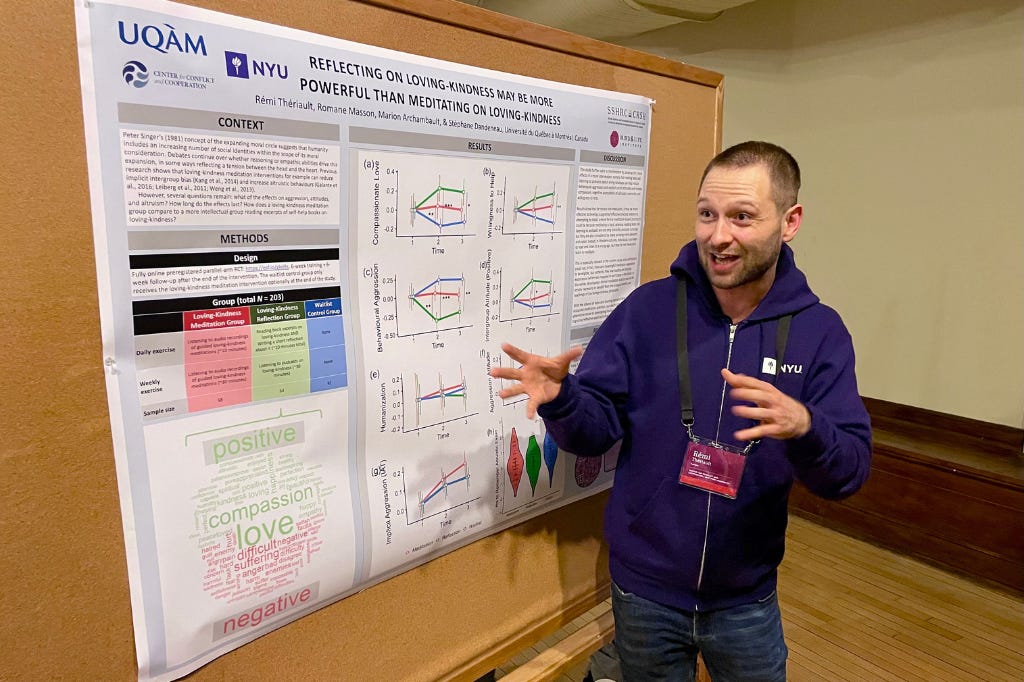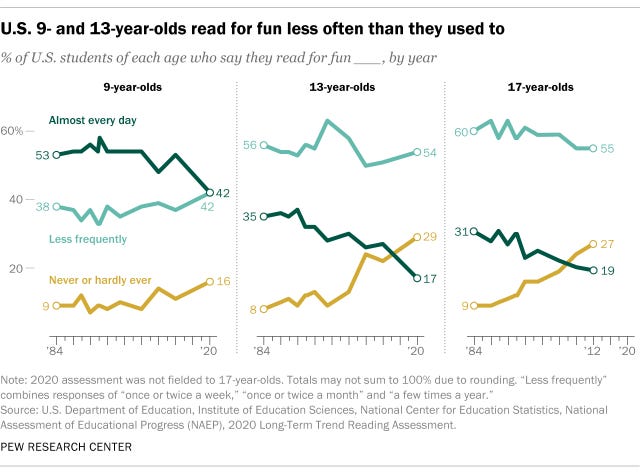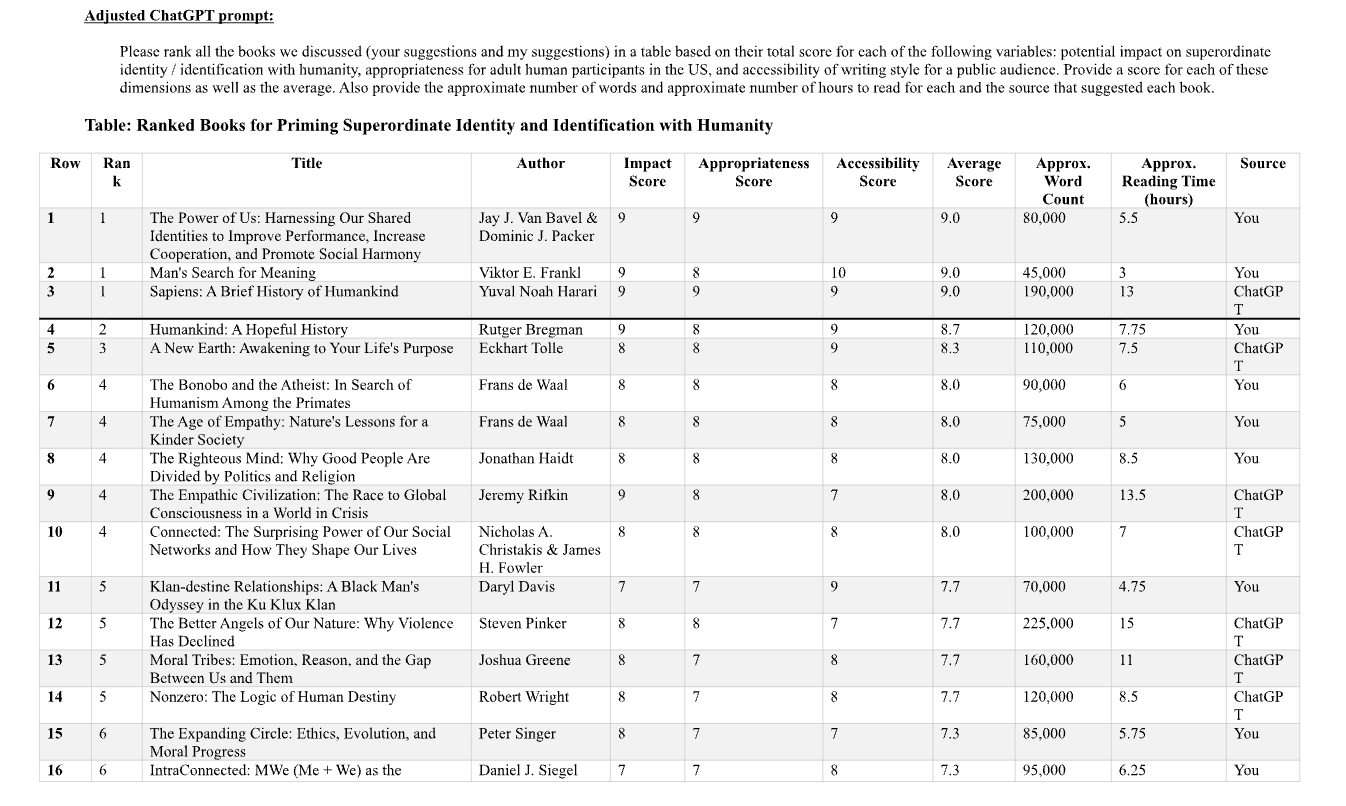Can reading a book make you a better person?
Issue 178: Research from our lab investigates if reading non-fiction books can make us more prosocial and less polarized.
This newsletter describes one of our new projects and is brought to you by Brynn Pedrick’s blog post, “Reading and Repair: Tacking Social Division Through Contemplative Research.“ We made some minor revisions and decided to share it with you to give you a sneak peak at our latest research.
In the last few years, we have seen headlines like “Why Kids Aren’t Falling in Love With Reading”, “Fewer People Are Reading for Fun”, and “Books vs. Brain Rot: why it's so hard to read” dominate the news. These have cast a chill over the publishing industry and led bookworms like us to panic about the future of humanity.
Despite the gloom, booksellers in the United States saw the first annual increase of print book sales in three years in 2024. It was a reminder that even in our increasingly digital age, books remain a powerful, and popular, force—not just for entertainment, but for personal growth. Maybe the media was too fast to write the obituary about books.
Social psychologist Rémi Thériault, who works in the Center for Conflict and Cooperation at New York University (seen in the photo below), isn’t surprised by the statistic. His own life was transformed at a young age by a self-help book, a gift from a family friend that helped reshape his outlook on life after undergoing treatment for Leukemia as a teenager.
Books have been central to shaping his life path—it was in book pages that he first learned about mindfulness, and that he was inspired to become a vegan. Starting at a young age, “books offered me an entry place to take control over my life, over what I could change,” says Thériault, “and this had a very large downstream effect on everything else in my life.”

While the benefits of reading fiction (like increasing empathy) are well-studied, the impact of reading nonfiction—especially the type of psychology books that encourage loving-kindness and recognition of our shared humanity that we highlight in this newsletter—remains largely unexplored. Remi hopes to change that in a new project with Jay. With funding from Mind & Life Europe, he will investigate whether reading popular nonfiction books with prosocial themes can foster inclusive social identities, reduce polarization, and promote compassionate, cooperative behavior.
The project stems from insights revealed in his 2018 Mind & Life Institute Varela grant, which tested a six-week intervention aimed at cultivating compassion and reducing prejudice through lovingkindness meditation practices. Remi was surprised to find that the meditation group in that study did not show the biggest changes. Instead, the active control—or ‘reflection’ group—who received weekly book excerpts and podcasts instead of guided meditations, had the greatest reductions in aggression and the largest growth in compassionate love, positive attitudes, and altruistic intentions.
Instead, the active control—or ‘reflection’ group—who received weekly book excerpts and podcasts instead of guided meditations, showed the greatest reductions in aggression and the largest growth in compassionate love, positive attitudes, and altruistic intentions.
Many of Remi’s peers weren’t surprised by this finding; the Buddhist path is not only about meditating, it’s also about studying the teachings and the sutras. Traditionally, they are always combined; meditation is not separate from the teachings, and they’re both reinforced by the Sangha, or community.
For newcomers to self-development and mindfulness, it makes sense that reading might be a more accessible entry point. Meditation can be harder than reading, which we have been doing for hours each day since we were kids. “Perhaps jumping into meditation without proper context—understanding the known positive impacts or the goals of the practice—won’t allow people to reap its benefits,” Remi underscores.
Now, instead of a 6-week intervention, participants in his new study will read a nonfiction book—ideally 10 minutes a day for 10 weeks. Remi and his team are leveraging artificial intelligence to select a publication for the study based on a wide array of criteria—like how likely the book is to reduce polarization, how accessible the book is for the average adult reader in the United States, and where the book falls on a spiritual-scientific scale.
Remi started to collect a list of potential nonfiction books and asked Chat GPT to rank the books in terms of impact (e.g., by creating a superordinate identity with all humanity), appropriateness, and accessibility. He was informed that and “The Power of Us: Harnessing Our Shared Identities For Personal And Collective Success” by Jay and Dominic, among others, were likely to increase a shared sense of identity and reduce polarization. (We included his prompt below with the results for the top 16 books in case you want to try this yourself).
In addition to those books, Remi has been reaching out to authors of similar books to ask for permission to include their books in the study. Several authors have offered their books for the study and many have recommended other books that seem like strong candidates to change readers. For instance, he plans to include “Love Your Enemies: How to Break the Anger Habit & Be a Whole Lot Happier” by Sharon Salzburg and Robert Thurman, “Plea for Altruism: The Power of Kindness” by Matthieu Ricard.
After conducting an initial pilot study to see which book is most likely to have an impact, the top ranked book will then be shared with participants to read daily, compared against an active control group who will be reading a neutral nonfiction book. The team will measure polarization, aggression, compassion, and intergroup social connections using both quantitative and qualitative measures. We predict that participants who read about kindness, compassion, and bridging divides will show improvements in polarization and prosocial emotions compared to those reading a neutral nonfiction book.
“It’s crazy that there’s so many people reading these types of books, that they’re so popular, and yet we have no idea what their actual impact is,” he says. Rather than creating a new intervention, Remi is eager to document the effects of what might already be happening in people’s daily lives. From there, he’ll analyze the text to understand why a book might be effective at decreasing polarization and increasing prosociality—things like analyzing popular passages highlighted by participants and the time spent reading different chapters. “It’s unlikely all books have the same impact on prosociality,” says Remi, “and if we care about polarization, maybe we should think about which books we read.”
“It’s unlikely all books have the same impact on prosociality, and if we care about polarization, maybe we should think about which books we read.”
A reading practice accompanied by other intellectual practices—like listening to podcast episodes—is the kind of intervention Remi believes can kickstart change in people’s hearts and minds. He sees this work as vital for uplifting adequate books for use as resources in schools, workplaces, and people’s personal lives.
“There’s more that unites us than divides us,” he says, a sentiment carried throughout his research and his hopes for the future. If his predictions hold true, this work could help transform the way we approach personal growth and social change. Alongside contemplative practices, “books are a kind of magic that brought meaning to my life,” shares Thériault. He’s hopeful that understanding their impact on polarization and well-being can help bring people more magic, and more meaning.
We are interested to know which books YOU believe might be particularly powerful to reduce polarization, and encourage readers to share their suggestions. Readers can share their book suggestions here. Please also leave your suggestions in the comments section for others to read.
News and Updates
Ask Me Anything sessions for fall! Paid Subscribers can join us for our monthly live Q&A with Jay or Dom where you can ask us anything from workshopping research questions, career advice to opinions and recommendations on pop culture happenings—for paid subscribers only. Upgrade your subscription before Sept 12th for a special 20% off!
Sept 11th: 4:00 EST with Jay (this happened today and was a lot of fun!)
Oct 16th 4:00 EST with Dom
Nov 6th 4:00 EST with Jay
Dec 11th 4:00 EST with Dom
Catch up on the last one…
Last time, we interviewed Steven Sloman about his new book on the costs of conviction. Check out our interview and win a free book below:





I suggested books of history above but here are popular non-fiction that encourage pro-social behavior:
How to Know a Person: The Art of Seeing Others Deeply and Being Deeply Seen
Book by David Brooks
Daring Greatly: How the Courage to Be Vulnerable Transforms the Way We Live, Love, Parent, and Lead
Book by Brené Brown
David and Goliath: Underdogs, Misfits, and the Art of Battling Giants
Book by Malcolm Gladwell
Think Again: The Power of Knowing What You Don't Know
Book by Adam Grant
Why We're Polarized
Book by Ezra Klein
yo this is cool i'll suggest The Sum of Us by Heather McGhee and Radical Compassion by Tara Brach